
Private Dancer is the fifth solo studio album by Tina Turner. It was released on May 29, 1984, through Capitol Records and was her first album released through the label. After several challenging years of going solo after divorcing Ike Turner, Private Dancer propelled Turner into becoming a viable solo star, as well as one of the most marketable crossover singers in the recording industry. It became a worldwide commercial success, earning multi-platinum certifications, and remains her best-selling album in North America to date.

Nicholas Drain Lowe is an English singer-songwriter, musician and producer. A noted figure in pub rock, power pop and new wave, Lowe has recorded a string of well-reviewed solo albums. Along with being a vocalist, Lowe plays guitar, bass guitar, piano and harmonica.
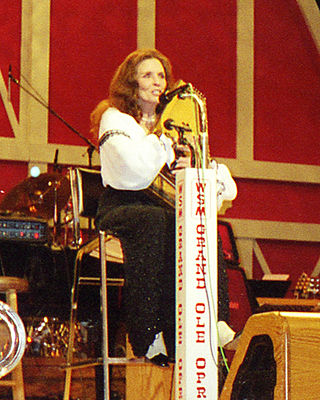
Valerie June Carter Cash was an American country singer and songwriter. A five-time Grammy award-winner, she was a member of the Carter Family and the second wife of singer Johnny Cash. Prior to her marriage to Cash, she was professionally known as June Carter and continued to be credited as such even after her marriage. She played guitar, banjo, harmonica, and autoharp, and acted in several films and television shows. Carter Cash won five Grammy Awards and was inducted into the Christian Music Hall of Fame in 2009.

"Mother" Maybelle Carter was an American country musician and "among the first" to use the Carter scratch, with which she "helped to turn the guitar into a lead instrument." It was named after her. She was a member of the original Carter Family act from the late 1920s until the early 1940s and a member of the Carter Sisters and Mother Maybelle group.

Phyllis Linda Hyman was an American singer, songwriter, and actress. Hyman is best known for her music during the late 1970s through the early 1990s. Some of her most notable songs were "You Know How to Love Me" (1979), "Living All Alone" (1986) and "Don't Wanna Change the World" (1991).
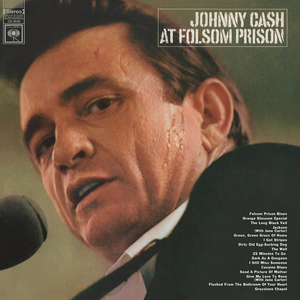
Johnny Cash at Folsom Prison is the first live album by American singer-songwriter Johnny Cash, released on Columbia Records on May 6, 1968. After his 1955 song "Folsom Prison Blues", Cash had been interested in recording a performance at a prison. His idea was put on hold until 1967, when personnel changes at Columbia Records put Bob Johnston in charge of producing Cash's material. Cash had recently controlled his drug abuse problems, and was looking to turn his career around after several years of limited commercial success. Backed by June Carter, Carl Perkins, and the Tennessee Three, Cash performed two shows at Folsom State Prison in California on January 13, 1968. The initial release of the album consists of fifteen songs from the first show and two from the second.
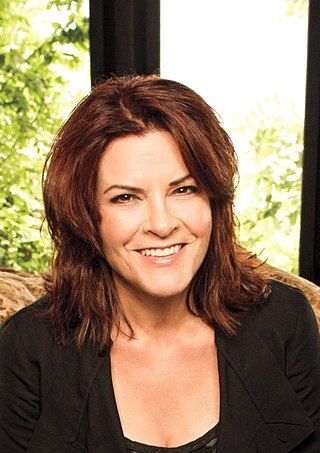
Rosanne Cash is an American singer-songwriter and author. She is the eldest daughter of country musician Johnny Cash and his first wife Vivian Cash.
Helen Myrl Carter Jones was an American country music singer. The eldest daughter of Maybelle Carter, she performed with her mother and her younger sisters, June Carter and Anita Carter, as a member of The Carter Sisters and Mother Maybelle, a pioneering all female country and folk music group. After the death of A.P. Carter in 1960, the group became known as The Carter Family.
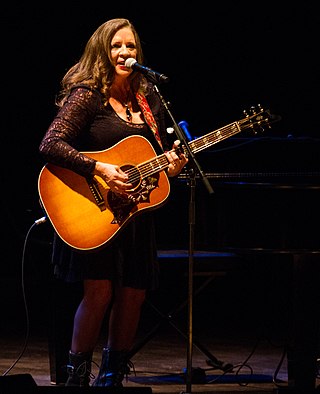
Carlene Carter is an American country music singer and songwriter. She is the daughter of June Carter Cash and her first husband, Carl Smith.

The song "Ring of Fire" was made popular by Johnny Cash after it appeared on his 1963 compilation album Ring of Fire: The Best of Johnny Cash. Written by Cash's eventual second wife, June Carter Cash, and songwriter Merle Kilgore, "(Love's) Ring of Fire" was originally recorded by June's sister, Anita Carter, on her 1962 album, Folk Songs Old and New.
"Cotton Fields (The Cotton Song)" (also known as In Them Old Cotton Fields Back Home) is a song written by American blues musician Huddie Ledbetter, better known as Lead Belly, who made the first recording of the song in 1940.
"If I Were a Carpenter" is a folk song written by Tim Hardin in the 1960s, and re-recorded with commercial success by various artists including Bobby Darin, The Four Tops and Johnny Cash. Hardin's own recording of the piece appeared on his 1967 album Tim Hardin 2. It was one of two songs from that release performed by Hardin at Woodstock in 1969. The song, believed by some to be about male romantic insecurity, is rumored to have been inspired by his love for actress Susan Morss, as well as the construction of Hardin's recording studio.

Little Fauss and Big Halsy is a soundtrack album to the 1970 film of the same name. Released on Columbia Records the same year, it features primarily songs by country singer Johnny Cash. The album includes tracks written by Cash, Carl Perkins and Bob Dylan, as well as several tracks performed by Perkins, but did not chart.

Press On is the Grammy Award-winning second album by singer June Carter Cash. It was released in 1999 by the Risk Records label and then later re-released by the Dualtone label. The album is notable for including June Carter Cash performing her composition "Ring of Fire", which is more closely associated with her husband, Johnny Cash.

Keep on the Sunny Side: June Carter Cash – Her Life in Music is a compilation album by June Carter Cash which spans from 1939 with The Carter Sisters and Mother Maybelle on the radio to her 2003 album Wildwood Flower. It was released in 2005.
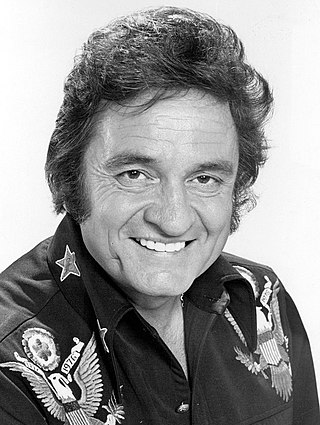
John R. Cash was an American country singer-songwriter. Most of Cash's music contains themes of sorrow, moral tribulation, and redemption, especially songs from the later stages of his career. He was known for his deep, calm, bass-baritone voice, the distinctive sound of his backing band, The Tennessee Three, that was characterized by its train-like chugging guitar rhythms, a rebelliousness coupled with an increasingly somber and humble demeanor, and his free prison concerts. Cash wore a trademark all-black stage wardrobe, which earned him the nickname as the "Man in Black".
The Carter Sisters, were an American band Each playing an instrument with June being a pioneer as a front-man or "person" consisting of Maybelle Carter and her daughters June Carter Cash, Helen Carter, and Anita Carter. Formed during World War II, the group recorded and performed into the 1990s. Maybelle and Ezra named the band "The Carter Sisters and Mother Maybelle" and recorded under that title for 2 record labels RCA and Columbia. Like any mother would, Maybelle wanted her daughters to be the face of the band so to speak.

Will the Circle Be Unbroken: Volume Two is the nineteenth studio album by American country folk group Nitty Gritty Dirt Band, released on May 1, 1989. The album follows the same concept as the band's 1972 album, Will the Circle Be Unbroken, which featured guest performances from many notable country music stars.

Country Christmas is the fourth Christmas album and 78th overall album by American country singer Johnny Cash, released on Laserlight Digital in 1991, in-between Cash's contracts with Mercury Records and American Recordings.

Keep on the Sunny Side, also known as Keep on the Sunny Side of Life, is a popular American song originally written in 1899 by Ada Blenkhorn (1858–1927) with music by J. Howard Entwisle (1866–1903). The song was popularized in a 1928 recording by the Carter Family. A recording of the song with The Whites was featured in the 2000 movie O Brother, Where Art Thou?.
















